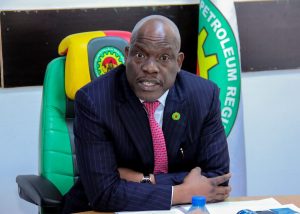
Oritsegbubemi Omatseyin
Lagos — The Commission Chief Executive of the Nigerian Upstream Petroleum Regulatory Commission, NUPRC, Engineer Gbenga Komolafe, has said that the 43 Field Development Plans, FDPs, recorded this year can unlock 1.7 billion barrels of crude and 7.7 trillion cubic feet of gas.
Engineer Komolafe gave the indication at the 43rd Annual International Conference and Exhibition, AICE, of the Nigerian Association of Petroleum Explorationists, NAPE, in Lagos.
Komolafe who was represented by the Director, Subsurface Development of the Commission, Emmanuel Mac-Jaja, noted that these FDPs reflected a resurgence in investments
Speaking on the theme, “Revitalising the Nigerian Petroleum Exploration and Production: Strategies for Energy Security and Sustainable Development,” Komolafe said the development depicts significant progress in Nigeria’s upstream sector.
“In 2025 alone, 43 new Field Development Plans, FDPs, were approved, unlocking 1.7 billion barrels of oil and 7.7 trillion cubic feet of gas, backed by over $20bn in committed capital,” he stated.
He added that major Final Investment Decisions, FIDs, including the $5 billion for Bonga North, $500 million for Ubeta Gas, and $2 billion for Shell’s HI Gas Project, unlocking nearly 2 trillion standard cubic feet of gas.
The NUPRC boss stated that indigenous participation continues to deepen, with local acquisition deals exceeding $5billion, signaling growing confidence in homegrown players.
He noted that Nigeria’s push to reignite oil and gas exploration and production has entered a new phase. According to him, Nigeria is at a defining moment in global energy one of transition, transformation, and opportunity.
Speaking on balancing transition with reality, the NUPRC boss observed that while the global shift toward renewables is gaining momentum, oil and gas will remain indispensable for decades to come, particularly in developing economies where energy access remains a critical challenge.
On upstream reforms powering growth, Engr. Komolafe outlined several ongoing initiatives aimed at repositioning Nigeria’s upstream sector for long-term progress.
These, he said, include advanced data systems that involve the use of cutting -edge technologies like stress field detection and an upgraded National Data Repository to de-risk exploration; continuous acreage licensing, which provides a transparent and predictable framework for global competitiveness; and the Project One Million Barrels, a push to restore and grow daily production through rig reactivation and well optimization.
He added that deepwater expansion, through cluster development and shared infrastructure, is helping to cut costs and accelerate first oil, while frontier basin development leverages the Petroleum Industry Act, PIA, to explore untapped basins across Nigeria.
On the increase in investments, Komolafe highlighted significant progress driven by these reforms. Rig activity, he said, has risen from just eight in 2021 to well over 40 today, reflecting renewed investor confidence in Nigeria’s upstream sector.
On environmental stewardship, Engineer Komolafe reaffirmed the NUPRC’s commitment to responsible operations through key initiatives such as gas flare commercialisation, the Decade of Gas, and the Presidential CNG Initiative, all designed to turn waste into wealth.
He also spotlighted the Commission’s Upstream Decarbonisation Framework, which integrates methane monitoring, carbon capture, and access to carbon finance.
In addition, the Host Community Development Trust, powered by the HostComply platform, ensures transparency, accountability, and shared prosperity for oil-bearing communities.
Komolafe expressed confidence that the reforms underway would firmly position Nigeria as a global energy hub once again.
This article was originally posted at sweetcrudereports.com
Be the first to comment